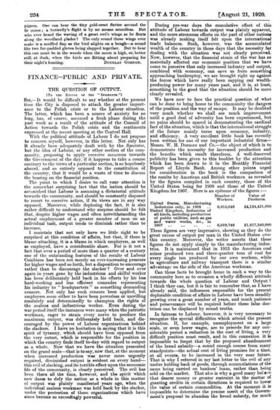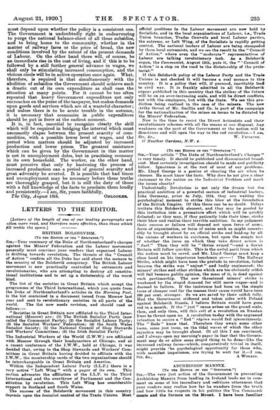FINANCE—PUBLIC AND PRIVATE.
rilh QUESTION OF OUTPUT.
[TO THE EDITOR OF THE " SPEOTATOlt."3
SIE,—It would be difficult to say whether at the present time the City is disposed to attach the greater import- ance to the Polish crisis or to the Labour situation. The latter, which has been a source of anxiety for so long, has, of course, assumed a fresh phase during the past week as a result of the attitude of the Council of Action towards the Polish crisis and the sentiments expressed at the recent meeting at the Central Hall.
With the political attitude of Labour I do not propose to concern myself, however, in this 'letter. Not only has it already been adequately dealt with by the Spectator, but the idea of Labour, or any other section of the com- munity, proposing to apply coercive measures towards the Government of the day, if it happens to take a course contrary to the views of a particular section, is so hopelessly absurd, and so entirely opposed to the constitution of -the country, that it would be a waste of time to discuss the bearing on the financial position.
The point to which I desire to call your attention is the somewhat surprising fact that the nation should be astonished that Labour is assuming a dictatorial attitude towards the community, and should be constantly disposed to resort to coercive action, if its -views are in .any way opposed. Moreover, while deploring the fact, it is also rather difficult to understand why surprise should be -felt that, despite higher wages and often notwithstanding the actual employment of a greater number of men on an individual task, output tends to diminish rather than to increase.
I maintain that not only have we little right to be surprised at this condition of affairs, but that, if there is blame attaching, it is a blame in which employers, as well as employed, have a considerable share. For is it not a fact that over a period of mare than a quarter of a century one of the outstanding features of the results of Labour Combines has been not merely an ever-increasing pressure for higher wages and so forth, but a disposition to encourage rather than to discourage the slacker ? Over and over again in years gone by the industrious and skilful worker has been deliberately held back in his efforts by his less hard-working and less efficient comrades representing his industry to " headquarters " as something demanding censure. Not only has such censure been applied, but employers seem either to have been powerless or unwilling resolutely and determinedly to champion the rights of the zealous and industrious worker. Even during the war period itself the instances were many when the patriotic workman, eager to strain every nerve to produce the maximum output, was deliberately held back, and dis- couraged by the power of Labour organizations behind the slackers. I have no hesitation in saying that it is this spirit of -tyranny, which should have been opposed from the very outset, which is responsible for the position in which the country finds itself to-day with regard to output as a whole. Now that we have the situation presented on the grand scale—that is to say, now that, at the moment when increased production was never more urgently required, diminished output is evident on every hand— this evil of slacking, and its terrible effect upon the economic life of the community, is clearly perceived. The evil has been there all the time, however, and the spirit which now dares to defy the nation as a whole in this matter of output was plainly manifested years ago, when the individual zealous workman was held back by the slacker, under the protection of those organizations which have since become so exceedingly powerful. During pre-war days the cumulative effect of this attitude of Labour towards output was plainly apparent, and the more strenuous efforts on the part of other nations was already making itself felt upon the international trade balances. Such, however, was the accumulated wealth of the country in those days that the necessity for dealing with the situation was not clearly perceived. Now, however, that the financial strain of the war has so materially affected our economic position that we have come to perceive that only increased industry and output, combined with economy, can save us from something approaching bankruptcy, we are brought right up against the forces which have really been sapping our wealth- producing power for many years past, and it is, at least, something to the good that the situation should be more clearly revealed.
We have now to face the practical question of what can be done to bring home to the community the dangers of the position and the way of escape. It may be doubted very much whether we shall see much improvement until a good deal of adversity has been experienced, but no pains should be spared in demonstrating the cardinal fact of. the situation, which is that the international struggle of the future mainly turns upon economy, industry, and efficiency. A very excellent little book has recently been written for one of our important industrial firms— Messrs. W. H. Dorman and Co.—the object of which is to demonstrate the necessity for increased production and the benefits which result therefrom. A well-deserved publicity has been given to this booklet by the attention which has been drawn to it in the Monthly Financial Report of Lloyds Bank. Among other points urged for consideration in the book is the comparison of the results by American and British workmen as revealed by the figures compiled in each country, those of the United States being for 1909 and those of the United Kingdom for 1907. Here is an epitome of the figures :- Number of Value of
Workers. Products.
United States, Manufacturing Industries only, in 1909 .. 6,615,046 £4,134,421,000 United Kingdom, Industries of -all kinds, including production of public utilities, such as gas and water works, &a., in 1907 .. .. 6,019,746 t1,617,340,000
These figures are very impressive, showing as they do the great excess of output per man in the United States over this country. Moreover, the writer asserts that these figures do not apply simply to the manufacturing indus- tries. It is maintained that in 1913 the American coal miner produced two and three-quarter tons of coal for every single ton produced by our own workers, while in agriculture and railway transport there is a similar advantage on the side of the American workman.
-Can these facts be brought home in such a way to the community here as to occasion a wholly different attitude towards the whole question of Labour and Output ? I think they can, but it is fair to remember that, as I have already said, the influences responsible for the present deplorable condition of affairs in Labour have been steadily growing over a great number of years, and much patience and perseverance will be required before these false doe- trines can be displaced by sound truths.
In fairness to Labour, however, it is very necessary to recognize the special difficulties which attend the present situation. If, for example, unemployment on a large scale, or even lower wages, are to precede for any con- siderable period a reduction in the cost of living, a very difficult position must result, and in this connexion it is impossible to forget that by the proposed abandonment of the bread subsidy—a sound enough course from many standpoints—the actual cost of living promises for a time, at all events, to be increased in the very near future. That is why I referred in my last letter to the evil of any undue holding back of goods, through accumulations of the same being carried on bankers' loans, rather than being sold on the market. That also is why a good many betece that dearer money or greater restraint in the matter of granting credits in certain directions is required to lower the value of certain commodities. At the moment it is impossible to determine the precise merit of the Govern- ment's proposal to abandon the bread subsidy, for much must depend upon whether the policy is a consistent one. The Government is undoubtedly right in endeavouring to purge the national balance-sheet of all these subsidies, and to bring home to the community, whether in the matter of railway fares or the price of bread, the new conditions involved by the extent of the present demands of Labour. On the other hand there will, of course, be an immediate rise in the cost of living, and if this is to be followed by a still further general advance in wages, we shall only be stimulating increased consumption, and the vicious circle will be in active operation once again. What, therefore, is required is that simultaneously with the abolition of subsidies the Government should achieve such a drastic cut of its own expenditure as shall ease the situation at many points. For it cannot be too often repeated that heavy Government expenditure not only encroaches on the purse of the taxpayer, but makes demands upon goods and services which are of a wasteful character ; and unless there is to be acute trouble in the autumn, it is necessary that economies in public expenditure should be put in force at the earliest moment. It is, in fact, essential to recognize clearly the skill which will be required in bridging the interval which must necessarily elapse between the present scarcity of com- modities, with a possible lower level of wages, and the period when matters should be adjusted by increased production and lower prices. The greatest assistance which can be given by the Government in this matter is not in unemployment doles, but in practising economy in its own household. The worker, on the other hand, must perceive that only by hastening the process of increased production can a period of general scarcity and great adversity be averted. It is possible that bad times and unemployment may be necessary before these truths are thoroughly grasped, but it is still the duty of those with a full loiowledge of the facts to proclaim them loudly and persistently.—I am, Sir, yours faithfully,



































 Previous page
Previous page